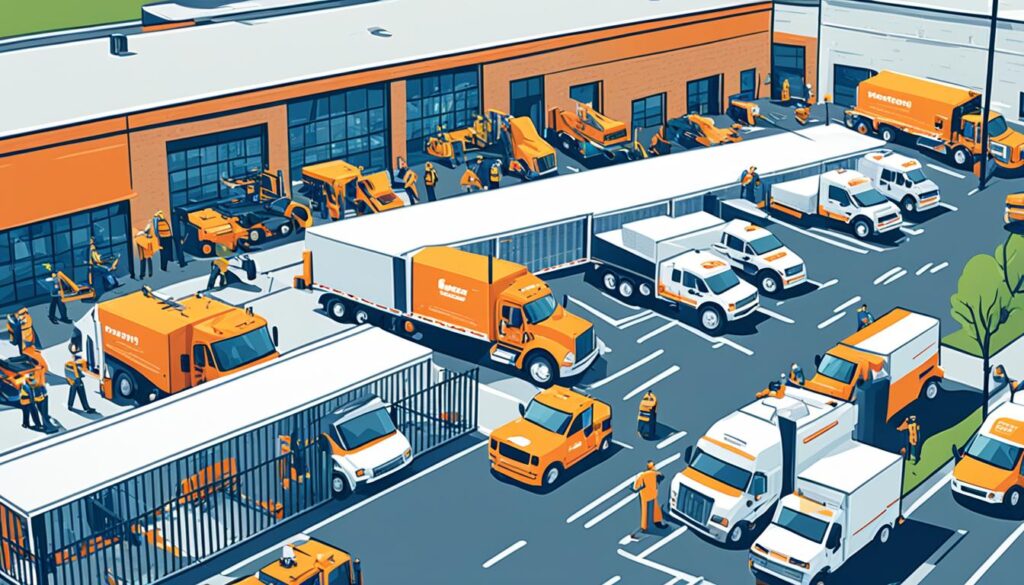In the United States alone, the fencing industry generates over $7.5 billion in revenue and employs more than 77,600 people. With the average cost of a fence exceeding $8,500, and rates ranging from $17 to $100 per linear foot depending on the materials used, starting a fencing business can be a lucrative venture. As a subset of the construction sector, the fencing industry specializes in the construction of various types of fences for different purposes, catering to both residential and commercial clients.
Running a successful fencing company requires physical strength and knowledge of building and construction. A typical day in fence installation involves erecting and fixing fences, conducting laborer interviews, marketing, acquiring licenses and permits, and creating bids and estimates. To get started, developing a comprehensive fencing installation business plan and joining the American Fence Association can provide you with valuable resources and training.
Key Takeaways
- The fencing industry generates over $7.5 billion in revenue and employs more than 77,600 people in the United States.
- Starting a fencing business requires physical strength, knowledge of building and construction, and a solid business plan.
- Joining professional organizations like the American Fence Association can provide valuable resources and training for fencing entrepreneurs.
- Fencing businesses cater to both residential and commercial clients, with rates varying based on the materials used and the complexity of the project.
- A typical day in fence installation involves erecting and fixing fences, conducting laborer interviews, marketing, acquiring licenses and permits, and creating bids and estimates.
Understanding the Fencing Industry
When considering starting a fencing business, it’s essential to understand the various types of fences and the materials used to construct them. Each type of fence has its own unique characteristics, depending on the materials used, the complexity of the build, and the number of workers required.
Types of Fences and Materials
There are several common types of fences, including:
- Wooden fences
- Concrete fences
- Barbed wire fences
- Chain link wired fences
- Picket fences
- Hedge fences
Some fences, such as picket fences and hedge fences, are primarily used for decorative purposes or to keep pets contained within a property. The choice of fencing materials, whether vinyl, wood, wrought iron, or another material, will impact the overall project cost and the rate charged to clients.
Market Demand and Growth Potential
The fencing industry has experienced significant growth in recent years. From 2012 to 2017, the fence installation market grew at a rate greater than 6%, with evidence indicating that this growth will continue due to increased service demand. The industry has an estimated revenue of over $7.5 billion, with more than 77,600 individuals working in the fence installation sector across over 48,000 enterprises in the United States.
The typical cost of a fence is more than $8,500, with fencing businesses charging between $17 and $100 per linear foot, depending on the materials used. The rise in income, housing values, home improvement, and remodeling expenses have all contributed to the industry’s continuous expansion.
Despite a recent decline in industry involvement due to various factors, low borrowing costs, falling unemployment, and rising income can positively influence the fencing industry. Increased income and housing values have had a favorable impact on the market demand for fencing, making it an attractive opportunity for those looking to start a fencing business.
Conducting Market Research and Feasibility Studies
Before diving into the fencing industry, it’s essential to conduct thorough market research and feasibility studies. These studies will help you gain a clear understanding of your target audience, the demand for fencing services in your area, and the level of competition you’ll face. By gathering this information, you can make informed decisions about your business strategy and increase your chances of success.
Identifying Your Target Audience
One of the key aspects of market research for your fencing business is identifying your target audience. Consider the following potential clients:
- Construction companies
- Real estate developers
- Corporate organizations
- Homeowners
- Landowners
- Farms
- Zoos
Each of these target audiences has unique fencing needs. Construction companies may require full-service fence installation to save time and resources, while real estate developers and corporate organizations may need secure fences with varying levels of complexity. Homeowners often seek fences for security, pet containment, or aesthetic purposes, and landowners may use fences to mark property boundaries. Farms and zoos have specific requirements for fences to keep animals separated or contained.
Analyzing Your Competition
In addition to identifying your target audience, it’s crucial to analyze your competition in the fencing industry. Conduct feasibility studies to determine the number of fencing companies operating in your area and assess their strengths and weaknesses. Take note of the services they offer, their pricing, and their reputation in the market.
While the level of competition in the fencing industry can be high, don’t let that discourage you. By establishing a reputation for quality service and consistently meeting deadlines, you can differentiate yourself from the competition and attract more clients. Focus on delivering exceptional results and building strong relationships with your customers to stand out in the market.
Defining Your Niche and Specialization
To stand out in the competitive fencing industry, it’s crucial to identify your niche and specialize in a specific area. By focusing on a particular type of fence, such as high-security fences or residential fences, you can establish yourself as an expert in that field. This specialization allows you to hone your skills and provide top-notch service to your clients.
Another approach to defining your niche is to concentrate on certain fencing materials. By becoming the go-to supplier for specific materials, you can attract fencing companies that require those products. This specialization can help you build strong relationships with clients and establish a loyal customer base.
However, the most effective way to differentiate yourself in the fencing industry is to be known for meeting completion deadlines without compromising quality service delivery. When you consistently deliver projects on time and maintain high standards, you’ll build a reputation for reliability and excellence. This reputation will lead to more referrals and repeat business, as satisfied clients recommend your services to others.
To successfully define your niche and specialization, consider the following steps:
- Assess your strengths and expertise in various fencing types and materials
- Research the demand for specific fencing services in your target market
- Analyze your competition and identify gaps in the market that you can fill
- Invest in training and certifications to enhance your skills in your chosen niche
- Develop a marketing strategy that highlights your specialization and unique selling points
By defining your niche and specialization, you can position your fencing business for success and growth in a competitive market. Focus on delivering quality service, meeting deadlines, and building a strong reputation to attract and retain clients in your chosen area of expertise.
Developing a Comprehensive Business Plan
A well-crafted fencing business plan is essential for the success of your venture. With over 48,000 companies specializing in fence installation in the United States alone and a revenue estimated at over $7.5 billion, the fencing industry offers significant opportunities for growth. However, to stand out in this competitive market, you need to set clear business goals and objectives, create a solid financial plan, and develop effective marketing strategies.
Setting Your Business Goals and Objectives
Begin by defining your business goals and objectives, such as:
- Target revenue: Aim for a specific annual revenue based on the typical cost of a fence, which is more than $8,500, and the fee range of $17 to $100 per linear foot charged by fence installers.
- Market share: Determine the percentage of the fencing market you want to capture, considering the growth rate of over 6% from 2012 to 2017.
- Growth rate: Set a realistic growth rate for your fencing business, taking into account the increasing demand from homeowners and developers.
Creating a Financial Plan and Budget
Develop a comprehensive financial plan and budget that accounts for all expenses, including:
- Tools and equipment: Invest in high-quality tools, trucks, trailers, and augers to ensure efficient and professional service delivery.
- Advertising and marketing: Allocate sufficient funds for promoting your fencing business to compete with established contractors and attract new clients.
- Property leasing: Factor in the costs of renting or leasing a workspace or storage facility for your fencing company.
- Taxes, workers’ compensation, and payroll: Account for all legal and financial obligations related to running a business and employing staff.
Outlining Your Marketing and Advertising Strategies
To attract clients and grow your fencing business, develop a robust marketing and advertising strategy that focuses on your unique selling points and target audience. Consider various marketing channels, such as:
- Website: Create a professional website that showcases your fencing services, portfolio, and customer testimonials.
- Social media: Leverage social media platforms to engage with potential clients, share industry insights, and promote your fencing business.
- Local advertising: Invest in targeted local advertising, such as newspaper ads, billboards, and sponsored events, to reach your target audience effectively.
Regularly review and adjust your fencing business plan as your company grows and evolves to ensure you stay on track to achieve your goals and objectives. By developing a comprehensive plan that encompasses financial, marketing, and operational aspects, you’ll be well-positioned to succeed in the thriving fencing industry.
Establishing Your Legal Business Entity
When starting a fencing business, one of the most crucial steps is establishing a legal business entity. This process involves choosing the right business structure, registering your business, and obtaining the necessary licenses and permits. By setting up a solid legal foundation, you can protect your personal assets, ensure compliance with regulations, and lay the groundwork for your fencing company’s success.
Choosing the Right Business Structure
Selecting the appropriate business structure for your fencing contractor business is essential. The most common and recommended option for this industry is a Limited Liability Company (LLC). An LLC offers several advantages, including:
- Personal liability protection, shielding your personal assets from business debts and liabilities
- Flexibility in management structure and taxation
- Credibility and professionalism in the eyes of clients and suppliers
To form an LLC for your fencing business, you’ll need to file the required paperwork with your state’s secretary of state office and pay the associated filing fees. Consulting with a business attorney or accountant can help you navigate the process and ensure that you choose the most suitable business structure for your specific needs.
Registering Your Business and Obtaining Licenses
Once you’ve chosen your business structure, the next step is to register your fencing business with the appropriate state and local agencies. This typically involves:
- Registering your business name with the state
- Obtaining an Employer Identification Number (EIN) from the IRS for tax purposes
- Applying for a state contractor’s license, which is required in most states for fencing companies
- Obtaining a business tax license and resale certificate to legally operate and purchase materials wholesale
In addition to these general requirements, be sure to check with your local government for any specific licenses or permits needed for fence installation in your area. These may include building permits, zoning permits, or environmental permits, depending on the scope and location of your projects.
By establishing a solid legal foundation for your fencing company, you can protect your business, maintain compliance, and set yourself up for long-term success in the industry. Don’t hesitate to seek guidance from legal and financial professionals to ensure that you have all the necessary licenses, permits, and contracts in place before launching your fencing business.
Acquiring the Necessary Equipment and Tools
To provide top-notch fencing services, it’s essential to invest in the right fencing equipment and tools. When you’re just starting out, you’ll need some basic items like fence stretchers, saws, drills, air compressors, post drivers, and concrete mixers. These tools will allow you to handle most standard fencing projects, such as installing picket fences or chain link wired fences.

As your fencing business grows and you take on more diverse projects, you may need to expand your inventory of fencing tools and materials. For example, if you’re working with urban clients, they may request more secure and aesthetically pleasing options like wood vinyl fences, stone fences, tin fences, or brick fences. These types of projects may require specialized tools and supplies.
On the other hand, if you’re catering to agricultural clients, you might need to stock up on materials for electric fences and barbed wire installations. These fences are commonly used to contain livestock and protect crops from wildlife.
When purchasing fencing equipment and tools, it’s important to choose high-quality items that will stand up to regular use. Investing in durable, well-made tools will save you money in the long run and ensure that your team can consistently deliver excellent results.
In addition to having the right tools, it’s crucial to keep a good supply of fencing materials on hand. This will allow you to take on jobs at short notice and avoid delays caused by material shortages. Some common fencing materials to keep in stock include:
- Wooden posts and rails
- Chain link wired mesh
- Vinyl panels
- Stone or brick veneer
- Metal posts and rails
- Wire for electric fences
- Barbed wire
By having a well-stocked inventory of fencing tools and materials, you’ll be prepared to handle a wide range of projects and provide exceptional service to your clients. As your business expands, be sure to continually assess your equipment needs and budget for new purchases to keep your team well-equipped and efficient.
Building a Strong Team of Skilled Professionals
As your fencing business grows, you’ll need to expand your team to meet the increasing demand for your services. Building a strong team of skilled fencing professionals is essential to delivering high-quality work and maintaining a competitive edge in the market.
When you’re just starting out, subcontracting fencing work can be a cost-effective option, as it requires less overhead and offers more flexibility. This allows you to take on projects without the commitment of hiring permanent fencing staff.
Hiring Experienced Fence Installers and Contractors
As your fencing company expands, it’s important to hire experienced fence installers and contractors who possess the necessary skills and knowledge to deliver excellent results. Look for individuals with a proven track record in the fencing industry and a strong work ethic. Consider the following when hiring your team:
- Verify their experience and expertise in various fencing materials and installation techniques
- Check references and reviews from previous clients and employers
- Ensure they have the necessary licenses and certifications required in your state
- Evaluate their communication skills and ability to work well in a team
Providing Ongoing Training and Support
To maintain a high level of service quality and stay up-to-date with industry standards, it’s crucial to provide ongoing training and support for your fencing team. This can include:
- Regular safety training to prevent accidents and injuries on the job site
- Product knowledge training to ensure your team is familiar with the latest fencing materials and techniques
- Customer service training to help your staff communicate effectively with clients and address their concerns
- Opportunities for professional development and career advancement within your company
By investing in your team and providing them with the tools and support they need to succeed, you’ll be able to deliver exceptional fencing services to your clients and build a strong reputation in the industry. Remember, your team is the backbone of your business, and their success is directly tied to your company’s growth and profitability.
How to Start a Fencing Business: Step-by-Step Guide
Starting a fencing business requires careful planning and execution to ensure success. By following a step-by-step approach, you can navigate the process of setting up your company and launching your services in the market. Here’s a guide to help you get started:
Registering Your Business and Obtaining Permits
The first step in starting a fencing business is to register your company and obtain the necessary permits and licenses. This process involves:
- Choosing a business structure, such as a sole proprietorship, partnership, or LLC
- Registering your fencing company with your state and local government
- Applying for a contractor’s license, business tax license, and resale certificate
- Obtaining any additional permits required for fence installation in your area
Consulting with a legal professional can help ensure that you have all the necessary documentation in place to operate your business legally and avoid any potential fines or penalties.
Setting Up Your Business Operations
Once you have registered your fencing business and obtained the required permits, it’s time to set up your business operations. This includes:
- Establishing a business bank account to separate your personal and business finances
- Obtaining business insurance to protect your company from potential liabilities
- Purchasing the necessary equipment and tools for fence installation, such as post hole diggers, saws, and concrete mixers
- Securing a storage space or warehouse to keep your equipment and materials
- Hiring skilled professionals, such as experienced fence installers and contractors, to join your team
By setting up a solid foundation for your business operations, you can ensure that your fencing company runs smoothly and efficiently from the start.
Launching Your Marketing Campaigns
Marketing is crucial for attracting customers and growing your fencing business. To launch your marketing campaigns, consider the following strategies:
- Develop a professional website that showcases your services, portfolio, and customer testimonials
- Create social media profiles on platforms like Facebook, Instagram, and LinkedIn to engage with potential clients and share your work
- Invest in local advertising, such as newspaper ads, billboards, and radio spots, to reach your target audience
- Attend industry events and join professional organizations, like the American Fence Association, to network with other professionals and stay up-to-date on industry trends
- Offer promotions and discounts to attract new customers and encourage repeat business
By consistently implementing these marketing strategies and adapting to changes in the market, you can build a strong brand reputation and grow your fencing business over time.
Maximizing Your Profits and Growing Your Business
To maximize your fencing business profits, consider purchasing wholesale fencing supplies and reselling them to your customers alongside your installation services. With retail sales accounting for a significant portion of the fencing industry, this strategy can help boost your revenue. Tailor your product offerings to specific customer segments, such as farmers or urban clients, by providing fencing materials and designs that cater to their unique needs.

Visual representations can be a powerful tool in finalizing sales and showcasing the quality of your products. By offering high-quality fencing solutions, you can build trust with your customers and encourage repeat business. Streamlining your fencing business operations is another key factor in increasing profitability. Look for ways to cut unnecessary expenses and optimize your costs without compromising on quality.
Embrace modern tools and technologies, such as field service management software, to improve efficiency and productivity within your fencing company. These solutions can help you better manage your projects, resources, and customer relationships, ultimately leading to increased fencing sales and business growth.
To ensure the long-term success of your fencing business, regularly monitor your financial performance and make data-driven decisions. Analyze your revenue streams, expenses, and profit margins to identify areas for improvement. By continuously assessing and refining your strategies, you can adapt to market changes and seize new opportunities for growth in the fencing industry.
Staying Competitive in the Fencing Industry
To thrive in the competitive fencing industry, you must stay ahead of the curve by keeping up with the latest trends and innovations. The demand for fencing services continues to grow, driven by increasing security concerns, property delineation, and the desire to enhance outdoor spaces. By attending industry events, joining professional organizations like the American Fence Association, and regularly researching new materials, techniques, and technologies, you can position your business to capture a significant share of this growing market.
One of the key fencing industry trends is the shift towards eco-friendly materials, innovative designs, and smart technology integration. By incorporating these elements into your fencing services, you can differentiate your business and appeal to environmentally conscious clients. Consider specializing in a specific niche, such as high-security fences or decorative residential fences, to stand out from competitors and establish your expertise in the field.
Keeping Up with Industry Trends and Innovations
To stay informed about the latest fencing innovations, consider the following strategies:
- Attend industry trade shows and conferences
- Join professional organizations and participate in their events and workshops
- Subscribe to industry publications and newsletters
- Follow leading fencing manufacturers and suppliers on social media
- Collaborate with other fencing professionals to share knowledge and best practices
Providing Exceptional Customer Service
In addition to staying up-to-date with industry trends, providing exceptional customer service is crucial for success in the competitive fencing industry. Prioritize client satisfaction by maintaining open communication, meeting deadlines, and ensuring high quality standards. Address any concerns or complaints promptly and professionally to build trust and foster long-term relationships with your clients.
To enhance customer service, consider implementing the following strategies:
- Develop a clear communication plan to keep clients informed throughout the project
- Establish a quality control process to ensure consistent, high-quality work
- Provide detailed estimates and invoices to maintain transparency
- Offer warranties or guarantees to demonstrate confidence in your work
- Regularly seek feedback from clients and use it to improve your services
By focusing on industry trends, innovations, and exceptional customer service, you can maintain a competitive edge in the fencing industry. Building strong relationships with your clients will lead to repeat business and positive word-of-mouth referrals, helping your fencing company grow and succeed in the long run.
Conclusion
Starting a fencing business presents a lucrative opportunity, as the demand for fencing services continues to grow across various industries. To establish a successful fencing company, it’s essential to gain a deep understanding of the fencing industry potential, conduct comprehensive market research, create a robust business plan, and secure the necessary skills and resources.
Carving out your niche, assembling a skilled team, and delivering top-notch customer service are key factors in staying competitive and growing your fencing business. By consistently adapting to industry trends, optimizing your operations, and investing in targeted marketing efforts, you can maximize your profits and achieve long-term success in the fencing sector.
Building a thriving fencing enterprise requires dedication, hard work, and an unwavering commitment to quality. By focusing on these critical elements, your fencing business can flourish and make a lasting impact in the market. Embrace the challenges, seize the opportunities, and watch your fencing company grow from strength to strength.
FAQ
What are the basic tools and equipment needed to start a fencing business?
What licenses and permits are required to start a fencing business?
How can I maximize profits and grow my fencing business?
What is the best business structure for a fencing company?
How important is customer service in the fencing industry?
What marketing strategies should I use for my fencing business?
Author
-

Lucas Martinez is an accomplished entrepreneur with a passion for startups. He has launched and scaled multiple businesses, providing pragmatic advice on starting and growing a business.
View all posts



